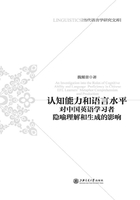
1.5.2 Conceptualization of language proficiency
As is discussed the previous section that cognition and language is closely related to each other and linguistic ability is also an important part of cognitive ability because people often use their linguistic knowledge to express the differences and similarities that they find about the world and to know the world around them.This seems to suggest that there is no need to distinguish between linguistic ability and cognitive ability.However, things might be different, at least to some extent, for people of different language proficiency levels.In other words, the linguistic ability for L1 speakers and L2 speakers, especially those with a low degree of L2 proficiency, might play different roles in their cognitive processes of the world.L2 speakers, due to their relatively low degree of proficiency in their foreign or second languages, often seek recourse to their L1 knowledge in the processes of knowing and expressing their ideas about the world, i.e., they express their ideas in L2 and think in L1.This is especially true when foreign language learners deal with abstract or difficult problems.Accordingly, for L2 learners, especially those who are not fully proficient in their L2, their ability to use L2 linguistic knowledge to cognize the world should be doubted, at least, limited.This hypothesis has been confirmed by a series of studies conducted by Jiang(2002;2004a;2004b)and Wang & Wen(2002).What is more, even if this relationship is not confirmed from the perspective of second language study, the relationship between language and thought as a philosophical issue is generally debatable.Accordingly, a distinction between cognitive ability and language proficiency(linguistic ability)is reasonable and needed in a research like the present one which aims to look into the respective roles played by each in EFL learners'metaphor comprehension and production.
The definition of language proficiency in second language acquisition research varies considerably due to its complexity and different purposes of relevant researches.Accordingly, no clear agreement on its construct has yet been reached.Generally speaking, however, these definitions can be classified into two types, i.e., language proficiency in the broad sense and in the narrow sense.In the narrow sense, language proficiency is defined to include only some of the linguistic components.For example, some research(Cumming 1989)defined second language proficiency as second language learners' speaking ability.Lee & Shallert (1997)used L2 vocabulary and grammar knowledge as the criterion to measure his subj ects'language proficiency, which are considered to be“the clearest examples to represent language proficiency”in L2 reading(Yamashita 2002:83).In the broad sense, language proficiency is termed as a multi-dimensional concept that comprises components of competencies and skills(Ma 2004:50).According to Ma(2004), “the competence components are subdivided into comprehension competencies of vocabulary, grammar and discourse and production competencies of vocabulary, grammar and discourse while the skills comprise comprehension skills of listening and reading and production skills of speaking.For instance, Martinez, Jr.(2003)has used the bilingual subjects'general knowledge or ability as their language proficiency to explore the relationship between language proficiency and metaphor processing.As a matter of fact, this broad definition of language proficiency appears to gain in popularity for language itself is complex.Just as Stern(1983:357)argued that“it would seem more reasonable to assume that proficiency in a language is multifaceted and can best be grasped by identifying two or more components rather than to expect to be expressed in a single concept”.Accordingly, language proficiency in the present research is also broadly defined.